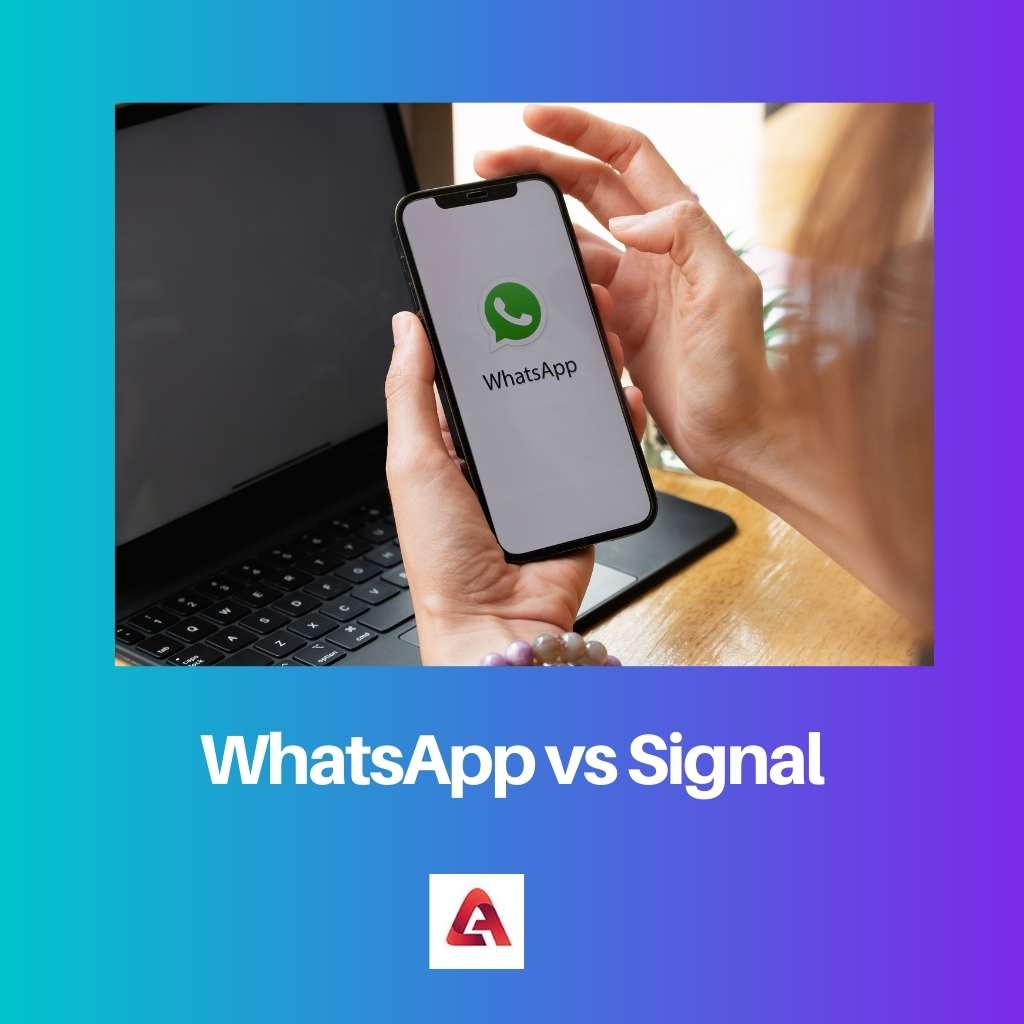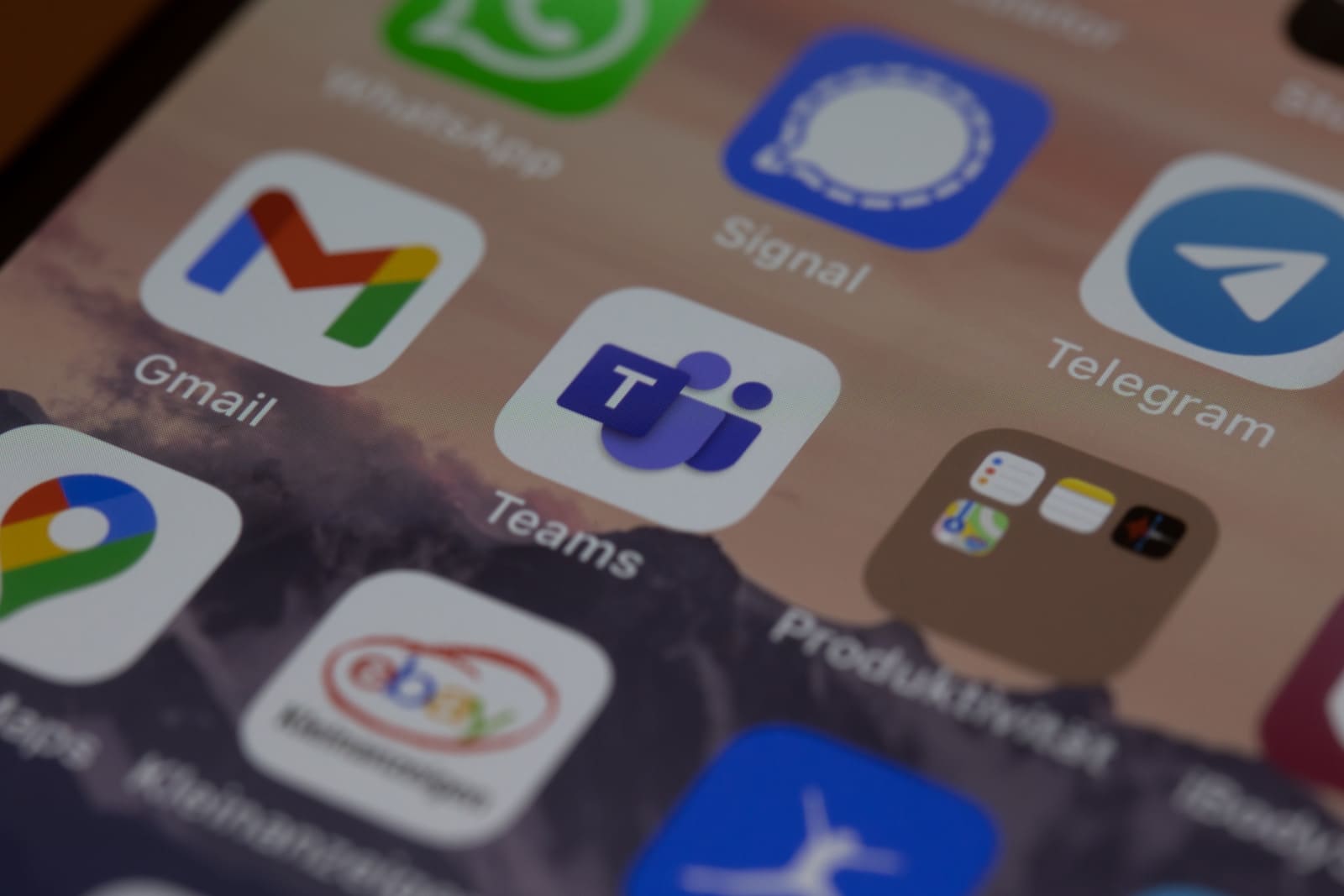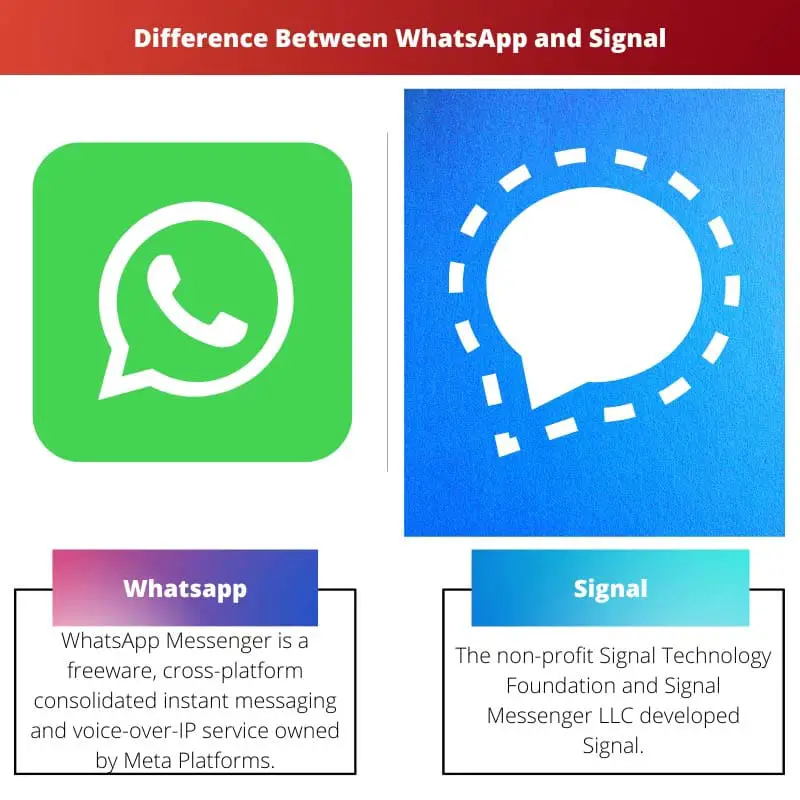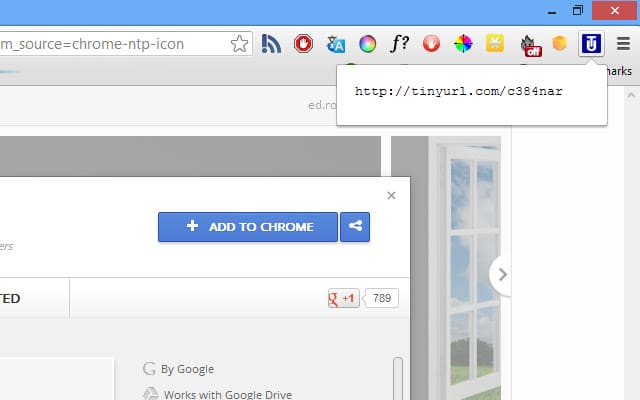Communication has made our life easier because we can communicate with one another even when great distances separate us. Communication technology has improved to the point that we can accomplish most of our job while sitting in one place, whether talking to friends or family members in different countries, ordering pizza, doing office work, or any other task requiring internet access.
Everything is done in a minute with the click of a button.
Key Takeaways
- WhatsApp provides end-to-end encryption but collects more metadata and user data than Signal, known for its privacy-focused features.
- Facebook owns WhatsApp, while the non-profit Signal Foundation develops Signal.
- Signal is open-source and relies on donations for funding, whereas WhatsApp monetizes through its business services.
WhatsApp vs Signal
‘WhatsApp’ is a popular messaging app owned by Facebook, offering features such as messaging, voice and video calls, and file sharing, with a big user base and end-to-end encryption. ‘Signal’ is a privacy-focused messaging app that prioritizes privacy by employing strong encryption, and features like disappearing messages and secure chats.

WhatsApp Messenger is a freeware, cross-platform consolidated instant messaging (IM) and voice-over-IP (VoIP) service owned by Meta Platforms that is available worldwide. Users can exchange text and voice messages, make audio and video chats, and share photographs, documents, user locations, and other stuff through the app.
You’ll need a cell phone number and internet connection to sign up for WhatsApp.
The non-profit Signal Technology Foundation and Signal Messenger LLC developed Signal, a cross-platform centralized encrypted instant messaging service. Users can send messages to individuals or groups, including files, voice messages, photos, and videos.
It can also be used to make group voice calls and video calls, and the Android version can also be used as an SMS application.
Comparison Table
| Parameters of Comparison | Signal | |
|---|---|---|
| Information Collected | Collects a lot of user information, like contact, identifiers, location, financial info, etc. | Collets only the contact information of the user |
| Security | Less secure | More Secure |
| Type | Instant messaging, VoIP | Encrypted voice calling, video calling, and instant messaging |
| Developer(s) | Meta Platforms, Will Cathcart (Head of WhatsApp) | Signal Technology Foundation, Signal Messenger LLC and contributors |
| Initial release | January 2009 | July 2014 |
What is WhatsApp?
WhatsApp is a communication app that is installed on our smartphones; we can use it to send and receive text messages, pictures, and videos make calls, and more. WhatsApp is free to download, sign up for, and use, it is also safe as long as you don’t talk to strangers and is easy to use.
WhatsApp uses the internet connection to send messages to our friends and family. If we connect our device to a WiFi network, WhatsApp won’t use our data plan.
We can import contacts from our device’s address book automatically without adding everyone individually; it will automatically detect which people are already using WhatsApp and add them as contacts. It offers a lot of options for ways to communicate; we can send text messages, and pictures, record audio or video messages, and make phone calls.
We can use the WhatsApp group chats feature to share comments, ideas, and updates with up to 100 people in one group message; this is a great way to send messages between a group of friends or for business teams that need to share information and collaborate.
Although WhatsApp is one of the best messaging apps, there are some flaws related to it, according to the recent findings:
According to researchers, WhatsApp has been found to have a worrying vulnerability.
– Due to a significant weakness involving only a phone number, users may be locked out of their accounts.
– It is recommended that WhatsApp users implement two-factor authentication on their accounts.

What is a Signal?
The Signal is considered the most secure messaging app; it does not collect any user data and the communication is completely encrypted. In 2010 IT security expert Moxie Marlinspike founded the company Whispersystems; he was one of the most mysterious people in the tech world. Not much is known about his childhood and early life.
He was a great programmer and a hacker. Whisper system was bought by Twitter in 2011, because Marlinspike, the head of cyber security, could work on improving the safety of the microblogging platforms this way.
In 2013 Marlinspike left Twitter and returned to working on encrypted communication with Open Whisper Systems, and this is how the Signal app came to life in 2015. Today Signal has approx 40 million users.
On the outside the,e app has an even more significant impact on end-to-end encryption. Facebook, Skype and Google use Signal encryption protocol, and even WhatsApp encrypts its data.
Brian Acton, the founder of WhatsApp, sold WhatsApp to Facebook; he is also a privacy fan. He, with Marlinspike, founded the Signal Foundation in 2018. The non-profit organization advocates for open-source private technology like the Signal app, acts and contributed capital of 50 million Euros to the foundation.
The Israeli software company Cellebrite had to experience how far Marlinspike is willing to go to defend his privacy messenger. Cellebrite offers digital and forensic tools for security agencies. The FBI uses this tool so does the military in Myanmar, and Cellebrite falsely claimed to be able to hack Signal.
Moxie Marlinspike was not going to give up so quickly. He then hacked Cellebrite and found security gaps that made it possible to manipulate the data Cellebrite provided to security agencies. Hence all the data in Cellebrite was potentially compromised and useless for a legal proceeding. And the charges put on Signal by Cellebrite can now be disputed in court.
Signal provides all the services that a demanding messenger should provide, and its security feature is outstanding. Still, it has been criticized that criminals and terrorists could also use the app for encrypted communication.

Main Differences Between WhatsApp and Signal
- WhatsApp does not include mobile text messages, whereas Signal includes mobile text messages.
- WhatsApp interface is straightforward to use, whereas the Signal interface is a bit difficult.
- WhatsApp collects more data as compared to Signal.
- WhatsApp has closed-source code, whereas Signal has open-source code.
- When it comes to secure messaging and user data, WhatsApp is considered less secure as compared to Signal.





